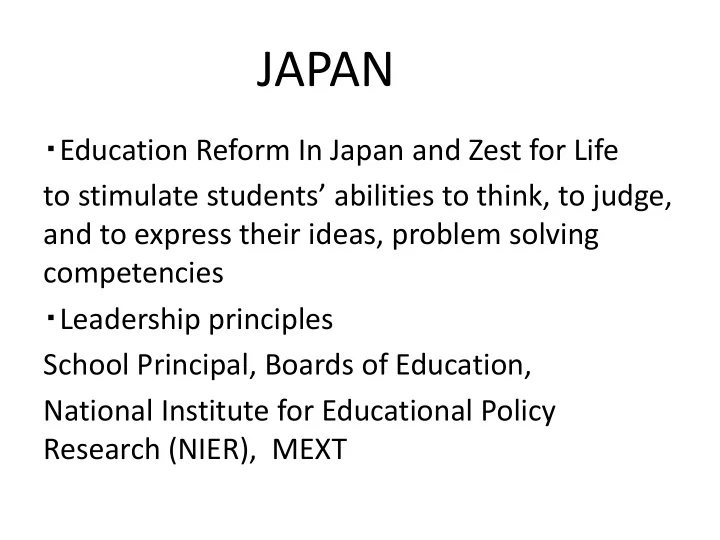

JAPAN ・ Education Reform In Japan and Zest for Life to stimulate students’ abilities to think, to judge, and to express their ideas, problem solving competencies ・ Leadership principles School Principal, Boards of Education, National Institute for Educational Policy Research (NIER), MEXT
Fulfilling Pedagogy and Sophisticated Practices and Research in Schools Elementary Schools Attached to the Faculty of Education at Tokyo Gakugei University Elementary Schools Attached to the Faculty of Education at Kagawa University Hiroshima Prefectural Shiraki High School (Kadoya, 2012). Fukuyama City Elementary School Onomichi City Harada Junior High School Hiroshima Prefectural Kure Mitsuta High School (Hiroshima Board of Education, 2012)
UNESCO/IFLA Public Library and School Library Manifestos A library is a gateway to knowledge. It allows equal access for all, regardless of age, gender, religion, nationality, profession, economic status, or social background. ・ The UNESCO/IFLA Public Library Manifesto ・ The UNESCO/IFLA School Library Manifesto Excellent joint research and practice efforts between the Tottori Prefectural Library and high schools in Tottori Prefecture (Kobayashi and Ueda: Monthly Gakko Tosyokan Magazine, 2008)
Young Adult Library Service Association and Teen Services Evaluation Tool • YALSA Teen Services Evaluation Tool for evaluating a public library’s overall level of success in providing services to teenagers, aged 12–18 years (1) Leadership and Professionalism (2) Knowledge of the Client Group (3) Communication, Marketing and Outreach (4) Administration (5) Knowledge of Materials (6) Access to Information (7) Services
Current Trend in Education in Japan ・ Education Reform and Educational Efforts Previous Basic Act on Education was revised in December 2006 ・ Three Laws on Education were reformed and promulgated on June 27, 2007 ・ Courses of study for upper secondary schools were revised in March 2008 “Zest for Life” was incorporated into the basic framework, principles, and policies (MEXT, 2009)
• Considerable effort to promote quality education by NIER (NIER, 2011; Kadoya, 2010) • Book Club Method was introduced in Japan by Mr. Hidefumi Arimoto (2010a, 2010b, 2011) It is a teaching method for developing reading literacy. The goals 1. to raise students’ willingness to read 2. to develop their abilities to read, write, and discuss the matters of daily life 3. to improve their quality of life by helping them develop communication skills
Recommend
More recommend